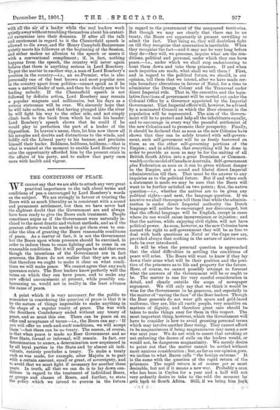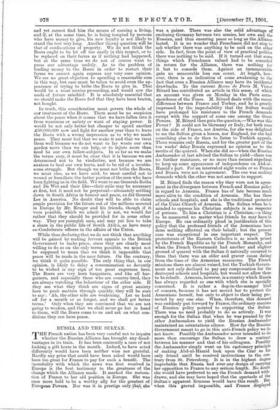THE CONDITIONS OF PEACE.
WE cannot say that we are able to attach any very great practical importance to the talk about terms and conditions of peace encouraged by Lord Rosebery's words on the subject. We are strongly in favour of treating the Boers with as much liberality as is Consistent with a sound and-permanent settlement,' but then we have never had the slightest doubt that the Government are and always have been ready to give the Boers such treatment. People sometimes -argue as if the Government were naturally in- elinedto the Matt drastic and violent methods, and as if the greatest efforts would be needed to get them even to con- sider the idea of granting the Boers reasonable conditions of -peace. As a matter of feet, it is not the Government but the Boers uponwhom pressure should be exercised, in order to induce them to cease fighting and to come in on reasonable conditions. But it will perhaps be Said that even though the. intentions -of the GOvernment are in fact generous, the Boers do not realise that *they are so, and that therefore we ought to make it clear on what condi- lions we ivill-make peace. We cannot agree that any such ignorance exists.. The Boer leaders knoW perfectly well the terms On which- they 'can -have peace, and to make any new' official inounCernent at present, while :.possibly em- barrassing us, would 'not in -reality- in-the least advance the realise of peace. • ..
-A point which it is very necessary, for the public to remember in considering the question of peace is that it is by the-nature of things impossible to make anything in the shape of a regular .treaty_ of peace. -The war with the Southern' Confederacy ended -without any. treaty of peace, and so must this- one. .There.„cat be peace on an offer and acceptanceof ternis---4.0.; the Boers can say : 'If you will offer us such-and-such :conditions, we will accept them '—but there-can be no treaty. The reason, of course, is-that when peace is made no Boer Government- and. no Nei State; formal or 'informal, will remain., In fact, our determination to annex, a determination now acquiesced in by all loyal, parties. in the State and. by almost U indi-. entirely precludes a treaty,. TO Make a treaty Elleh.as was made, for example,- after -lktajuba is, to. part: with a certain amount, small or great, of sovereignty, and, tO avoid. that wi.must -fight if necessary for.inother three Iii truth, all that we :can. do-.is to lay down con- ditions in -regard. to the treatment of individual Boors, or groups and classes -of.. Boers,, and ..further, to state the -policy .which we intend . to ...pursue in. the 'future in regard- to the-gliteffifilent-ortlie-btaiquered" ferritories. But though we may see clearly_ that there can be no treaty, the Boers are apparently at present unwilling to admit the Tact. That being so, they will doubtless fight on till they recognise that annexation. s inevitable. When they recognise the fact—and it may not be-very long before they 'do---they will, we presume, inquire what are the political and. personal, under which they can have peace,—i.e., under which we shall stop endeavouring to hunt them down and take them prisoners. If and when such inquiries are made, what shall we tell them ? First, and in. regard to the political future, we should, in our' opinion, tell them that we intend, after we have made cer- tain boundary alterations in favour of Natal, for a time to administer the Orange Colony and the Transvaal under: direct Imperial rule. That is, the executive and the legis- lative functions of government will be carried out under the Colonial Office by a Governor appointed by the Imperial Government. That Imperial officer will, however, be advised by a nominated Council on which the Boer element in the. population will be- represented. The aim of the Govern, • ment will be to protect and help all the inhabitants equally, . and to encourage in every way the peaceful settlement of the new Colonies and' to promote their Drosperity. it should be declared that as soon as tge new Colonies have shown that they can be safely trusted with self-govern- ment, such self-goverment will be as freely bestowed on them as on the other self-governing portions of the Empire ; and in addition, that everything will. be done in' order to provide as soon -as may be for the uniting of all . British South Africa- into a great Dominion or Common- wealth on the model of Canada or Australia. Self-government ' plus Federation as soon as it can be given without danger . to the Empire, and a sound and liberal direct Imperial - administration till then. That must be the answer to any . inquiries as to the political future. But if and when such a statement is made .we may be sure that the Boers will: want to be further satisfied on two points ; first, the native question—i.e., whether the natives are to be given any - political rights—and next, the language question. If we. arewise we shall thereupon tell them that while the adminis- tration is under direct Imperial authority the. Dutch language will neither be encouraged nor discouraged, bilt that the official language will be English, except in cases where its use would cause inconvenience or injustice;' and that the natives, while enjoying civil rights, will not have political power. As soon, however, as the new Colonies have earned the right to self-government they will be as free to deal with both questions as Natal or the Cape now are, provided always that nothing in the nature of native servi- tude be ever introduced.
It will be when the personal question is approached. that the chief difficulties in settling the conditions of peace will arise. The Boers will want to know if they lay, down their arms what will .be their position and the posi- tion of the prisoners as to life and property. for the future. Here, of course, we cannot 'possibly attempt to forecast what the answers of the Government will be or ought to be. The matter is one for very careful consideration in detail, and dearly outside. the scope of newspaper argument. We will only say that we think it would be wise for the Government .to be generous, and especially in the matter of "saving the face" of the Boer leaders.' Though the Boer generals do not wear gilt spurs and gold-laced" uniforms, they are, like all rustic people, very sensitive on . matters of dignity, and therefore great . care should be: taken to make things easy for them in this' respect. The most important thing, however, which the Government will have to consider is.how to, avoid granting. personal terma. which may involve another Boer rising. They cannot afford to be magnanimous if being magnanimous may mean a new war next year. We do not wish to assert that revoking or not enforcing the decree of exile On the leaders would, or woUld not, be dangerous magnanimity. We merely desire to .point out that the matter cannot be . settled without' most anxious consideration ; but, as far as our opinion goes, we incline to whit Bacon calls "the benign extreme." It is the same with the question Of the rapid return of the prisoners. The rapid return ii of course per se most' desirable, but not if it means a new war. Probably a min. who has been in Ceylon for a year and a. half will not'- very ardently desire to take to the veld the moment he gets bjfelt to South Africa. Still, if we bring him 1)014 and, yet cannot find, him the means of earning a living, and if,' at the same time, he is being tempted by persons who have money to give, his new loyalty is not likely to stand the test" very long. Another thorny question will be that of confiscations of property. We do not think the Boers ought to be let off too easily in this respect, or to be replaced on their farms as if nothing had happened, but at the same time we do not of course want to press our advantage unduly. As to the problem of lending money to the Boers in order to restart their farms we cannot again express any very sure opinion. We see no great objection to spending a reasonable sum in this way, but care must be taken to avoid even the ap- pearance of trying to bribe the Boers to give in. That would be a most unwise proceeding, and would sow the "seeds of future mischief. It is absolutely essential that we should make the Boers feel that they have been beaten, not bought.
In truth, this consideration must govern the whole of our treatment of the Boers. There must be no suspicion about the peace when it comes that we have fallen into it from weariness or satiety or want of staying power. It would be not only better but cheaper to spend another £50,000,000 now and fight for another year than to leave the Boers with a wrong impression as -to why we made peace. They must feel that we make it and. that we treat them well because we do not want to lay waste our own garden more than we can help, or to injure more than need be our own fellow-subjects. In so far as we make the terms easy, it must be clear that it is because we are determined not to be vindictive, not because we are .anxious to heal our own hurts, and to be rid of a trouble- some struggle. But though we must not bribe the-Boers, we must also, as we have said, be most careful not to wound or humiliate the better portion of the men who have been fighting us in the field. We want to see Generals Botha and Be Wet and their like—their exile may be necessary at first, but it need not be perpetual—ultimately settling down in South Africa in honour and peace, as did General Lee in America. No doubt they will be able to claim ample provision for the future out of the millions secreted in Europe by Mr. Kruger and his friends, though if it were possible, which we admit it is not, we would far rather that they should be provided for in some other way. They are youngish men, and may yet live to take a share in the public life of South Afii2a, as have many ex-Confederate officers in the affairs of the Union.
While thus declaring that we do not think that anything will be gained by making fervent appeals to the British Government to make peace, since they are clearly most willing to do so on the only terms possible, we must not be supposed to mean that we think it impossible that peace will be made in the near future. On the contrary, we think it quite possible. The only thing that, in our opinion, is likely to delay a consummation so devoutly to be wished. is any sign of too great eagerness here. The Boers are very keen bargainers, and like all bar- gainers, and especially those who are country-bred, they are always watching the behaviour of the other side. If they see what they think are signs of great anxiety here to push matters through quickly, they will be sure to say : 'Ah, the other side are weakening. Let us hold off for a month or so longer, and we shall get better terms.' Only when they are convinced that we are not going to weaken, and that we shall never go hat in hand to them, will the Boers come to us and ask on what con- ditions they can have peace.











































 Previous page
Previous page